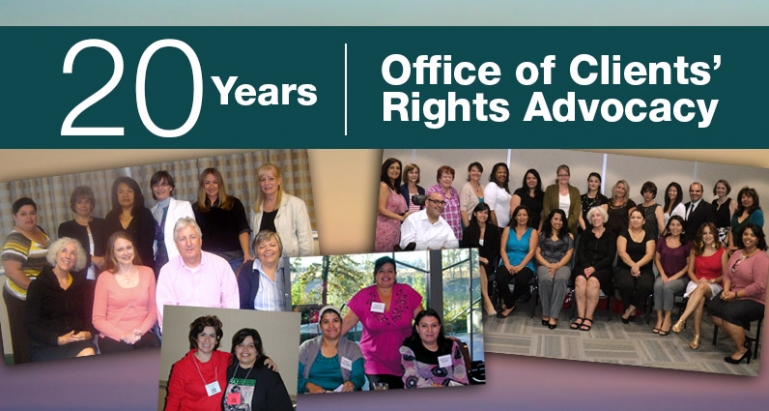DRC’s Office of Clients’ Rights Advocacy helps regional center clients and their families

DRC’s Office of Clients’ Rights Advocacy helps regional center clients and their families

The Office of Clients’ Rights Advocacy (OCRA) provides advocacy services to regional center consumers who have intellectual and developmental disabilities.
In 1999, Disability Rights California, then known as Protection and Advocacy Inc. (PAI), was awarded the contract by the Department of Developmental Services to provide clients’ rights advocacy services to consumers of California’s 21 regional centers. Soon, OCRA would become PAI’s largest unit with 65 employees.
Alice Ximenez, OCRA office manager, who has been with OCRA since its inception, said there were many discussions about how to best structure the new unit during that time.
“As we opened the doors, we knew that all those many little things we had to do [to get the program up and running], including ordering furniture and supplies, setting up equipment, hiring new staff, creating training materials, would mean so much more for the people we were about to provide services to,” Ximenez said.
OCRA hired one Clients’ Rights Advocate and one Assistant Clients’ Rights Advocate in each regional center catchment area to ensure regional consumers and their families had easy access to resources.
Katie Hornberger, OCRA director, explained, “Having people in those local areas really makes a difference. It enables our staff to become very familiar with local resources and develop relationships with local providers.”
Hornberger said OCRA’s aim is to provide local services -- big or small. OCRA handles over 10,000 issues each year, working with over 7,000 regional center clients and their families, and participating in over 300 outreach and training events each year reaching over 6,000 attendees.
Hornberger started with DRC as a Clients’ Rights Advocate at the North Los Angeles County Regional Center in January 2001. She said the unit has grown significantly in staff size and scope of advocacy. Over the years, OCRA has become more involved with clients who live in institutions and other facilities and in committee work like the Local Advisories Committees for the Self Determination Program.

Clients Rights Advocates (CRA) provide assistance to regional center consumers and their families on a variety of issues. For example, recently a Clients’ Rights Advocate helped a client whose money manager cut the individual’s pocket spending money in half, from $20 to $10 per month. The CRA helped the client to reclaim their $20 per month allowance and to find a new person to manage their money.
“People need to have input over their own lives. They need to feel like they have some control of their life and have the satisfaction of making their own decisions. That’s really meaningful,” said Hornberger.
In another case, a young man with autism couldn’t attend a private school because of his disability-related behaviors. He lost three weeks of instruction with no services from the school district. The associate clients’ rights advocate, reviewed Donald’s records and helped prepare a California Department of Education compliance complaint against the district.
“Donald’s mother only speaks Spanish and her many requests for help from the school district were ignored until she contacted us. I’m glad we could help,” said the advocate. The department issued an order to return Donald to school. He also received 70 hours of individual tutoring as well as speech and language therapy.
Over the years, OCRA has increased its work with people living in institutions, especially those living in developmental centers. The work also increased because of the 2012 moratorium on placing people in these state facilities and the announcement of the expected closures. OCRA staff work to ensure that people move from developmental centers into the least restrictive environment with the appropriate services and supports. Staff also work to ensure that people living in the community who go into a facility due to a crisis are quickly moved back into the community with supports.
“Who knew after so many years that OCRA would evolve into what it is today?” Ximenez said. “I am happy I stayed for the ride to see what changes have been made for consumers, and I have enjoyed seeing OCRA staff serve the many consumers, just as it planned so many years ago.”




